A visit to Le Bristol, the hotel hosting the rich and famous during the Paris Olympic Games
The planet’s most Parisian lodgings turns 100 years old amid the world’s biggest sporting event and has been sold out for months. Refuge for the powerful, its well-earned fame as a secure place with good hot chocolate has attracted guests such as David Beckham and Woody Allen
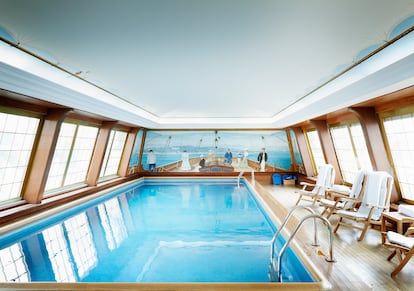
A stately gentleman in an expensive trench coat is inclined to check out from his hotel. He is in a hurry, his glasses foggy. Perhaps, they are dirty as well. When he goes by reception to leave his keys — impossible to bring them anywhere, they are far too heavy — the concierge asks to see his glasses, please. The gentleman turns them over, a nearly automatic gesture. The employee cleans them slowly, with dedication, then looks at them, checks them over and gives them back. Everything in order. No one leaves Le Bristol Paris in anything but perfect condition. It’s like one’s family home — it may be luxurious and costly, but it is also a place where everyone takes care of you.
This gem of the world’s upscale hospitality industry is about to turn 100 years old. It was inaugurated in 1925, and since then, has not made the slightest concession to modernity. Owned by the Oetker family since 1978, it is the only major luxury hotel still in European hands that is not part of a chain or a limited partnership. “It belongs to real people, and it shows,” sums up Jean Marie Burlet, head of guest relations. In 2010, Le Bristol became the first to receive the “palace” rating from the French Ministry of Tourism, awarded to exceptional five-star hotels. There are only 12 such establishments in Paris.

So much has taken place here that the hotel has assumed a place in literature and film. Woody Allen must be of the same mind as the writers of the Michelin Guide in that, though there are many hotels in Paris that recreate the luxurious decadence of olden days, only Le Bristol has the real thing, with its original Louis XV furnishings and portrait of Marie Antoinette by François-Hubert Drouais (one of the court’s official portrait painters), pastel hues and six-pound keys from 1925, all at one’s service. “Le plus chic et le plus discret” (“the most elegant and most discreet”) in Paris. In Midnight in Paris (2011), the filmmaker placed the characters of an upper-class American family in the panoramic suite, one of the hotel’s most popular, to live out that particular Parisian fable.
The hotel has been sold out during the Olympic Games for months. It has received both friends and foes alike. Le Bristol’s location at 114 Rue du Faubourg Saint-Honoré, a few feet from the Élysée Palace in the eighth arrondissement, is one of the safest areas of Paris. “Whatever happens in the city, it will be fine here,” says Burlet. That fact must be of great service to Taylor Swift, who slept here on the Parisian nights of her Eras tour, and David Beckham, who lived in one of the hotel’s suites for six months while playing for Paris Saint-Germain F.C. in 2013. Upon checking out, he left behind 100 pink roses as a gift.
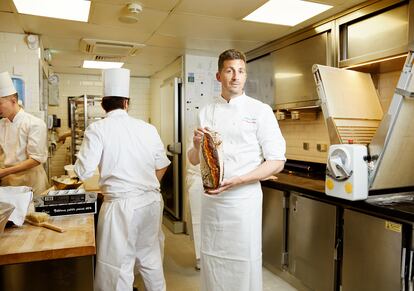
Le Bristol’s reputation as a safe haven was consolidated during World War II. Its first owner, Hippolyte Jammet, was a visionary: his hotel was the first to have air conditioning and room service. In 1940, smelling danger from another world war, he built an air-raid shelter in the basement. During the same period, he offered his hotel to the U.S. ambassador William Bullitt as an embassy and residence to Americans who found themselves trapped in the city. As part of this arrangement, Jammet was able to guarantee that Le Bristol, which was next door to the German embassy, was spared constant Nazi inspections. In so doing, he saved its principal architect’s life.
Leo Lehrman was Jewish. He was tasked with overseeing the building’s renovations, and spent the occupation years hidden in Suite 106, whose room number was erased, its existence hidden amid the hotel’s record-keeping. During the day, Lehrman hid and at night, he walked through the deserted halls of the mansion, meditated and made plans. Such was his life for three years, until the war ended. At that point, he left and to this day, nothing is known of him nor of his descendants, despite research that the current administration of Le Bristol has carried out in the hopes of finding the architect. The beautiful, twisted iron elevator in the reception area was Lerman’s masterpiece, and in gratitude, he donated it to the hotel.
Sometimes Tony Le Goff, head concierge, tells this story to those impatiently awaiting the elevator. But it is actually his job to talk to them about the Paris of today, to send them places no one else can go, get them tickets that are presumably sold-out, nab reservations in restaurants with lengthy wait lists, find confidential phone numbers and arrange improbable meetings with illustrious Parisians (one Swiss client asked him for a meeting with Nicolas Sarkozy). “My job is to make the idea of the city they have in their heads a reality,” says Le Goff, who boasts that everyone in Paris answers his calls. “My connections are more personal than professional,” he continues. At the moment, he is busy trying to shut down the Palace of Versailles for an Austrian family who detests rubbing elbows with tourists. “It’s not free. and it will be expensive, but it is possible,” he says. For Valentine’s Day, he was able to get them to open up the Musée Carnavalet at night — for free — for a married couple.
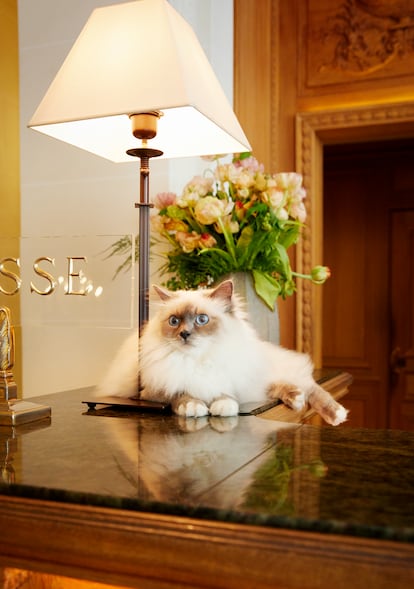
The clientele who chose Le Bristol to live out the classic French experience, with all its accompanying stereotypes, do encounter one problem upon arrival: there are no baguettes. Yes, there are delicious croissants at $20 apiece and a legendary hot chocolate that runs $21 a cup at Café Antonia. But baguettes are not to be found. That decision belonged to chef Éric Frechon, who for years led the three-Michelin-star Épicure, one of the hotel’s gastronomic jewels, now run by Arnaud Faye. (Le Bristol would gain a fourth star via its other restaurant, Brasserie 114 Faubourg.) We went to the bakery, which has been in operation since 2018, to learn firsthand how it is simply not possible to give a venerable and 100% natural sourdough the stylized shape of the iconic, angular French creation. Though the bakery makes 11 types of bread every day, most of them are in the shape of loaves. Le Bristol is the only hotel in the world that features its own grain mill. It also makes its own dough and its own chocolate. It turns out that true luxury does not ask its guests for their allergies and intolerances.
Burlet has worked at Le Bristol for 30 years and has notes some differences in its clientele. “Nowadays they spend more carefully, ask for prices, compare and look for discounts online. Dress codes have also changed. Before, it was a suit jacket, button-down shirt and tie. Now people don’t even bring a tie with them when they travel,” he says. He is in charge of telling customers who arrive in shorts and sneakers to dinner at Épicure that they may not enter the temple of cuisine attired in such a manner. “We lend them pants and shoes, we have them in every size. A dinner party is a staging; if everyone is not in costume, the show around the table will be off and it will be difficult to concentrate on the hotel’s gastronomic offerings,” he says.
The head of guest relations at Le Bristol has mastered the art of saying “no” without the guest even noticing. “They nearly always know the answer before they ask. Once in a while you can tell them, ‘Sir or Madam, this is the third time you have asked me the same thing, or sent someone else to ask, what can we do to come to an understanding?’ There are many ways to tell people that what they want is not possible.”
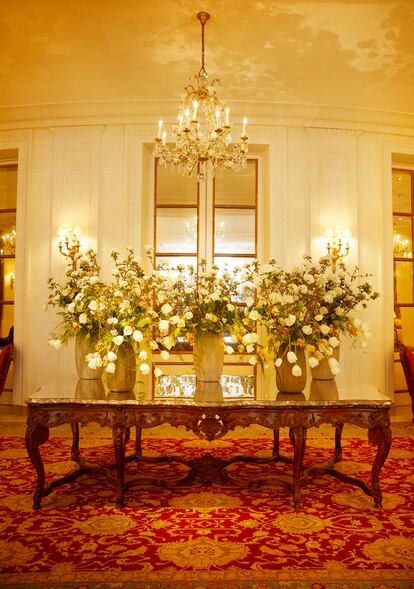
If you lead a life of love and luxury, it is possible that you have a pet who enjoys the same privileges. And for them, Le Bristol is pet friendly. In its rooms, we have seen an English bulldog slip between Louis XV sofas, as if it had been trained all its life to nap upon Gobelin upholstery and play with heavy drapery. Socrate, the Burmese cat who lives in the hotel, is less brazen. We had to launch quite the chase to take his picture. He posed, but then ran off to one of his favorite hiding places. With any luck, you can find him in his very own suite.
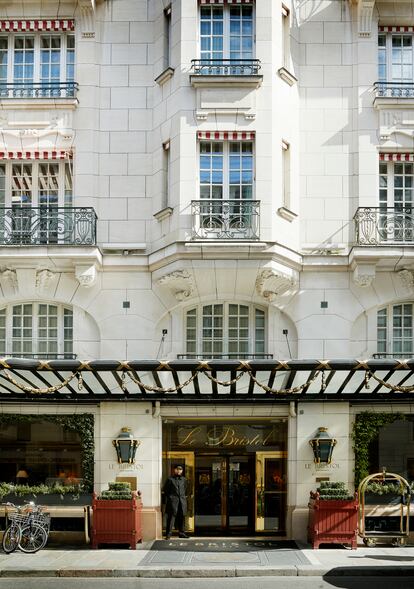
Sign up for our weekly newsletter to get more English-language news coverage from EL PAÍS USA Edition
Tu suscripción se está usando en otro dispositivo
¿Quieres añadir otro usuario a tu suscripción?
Si continúas leyendo en este dispositivo, no se podrá leer en el otro.
FlechaTu suscripción se está usando en otro dispositivo y solo puedes acceder a EL PAÍS desde un dispositivo a la vez.
Si quieres compartir tu cuenta, cambia tu suscripción a la modalidad Premium, así podrás añadir otro usuario. Cada uno accederá con su propia cuenta de email, lo que os permitirá personalizar vuestra experiencia en EL PAÍS.
¿Tienes una suscripción de empresa? Accede aquí para contratar más cuentas.
En el caso de no saber quién está usando tu cuenta, te recomendamos cambiar tu contraseña aquí.
Si decides continuar compartiendo tu cuenta, este mensaje se mostrará en tu dispositivo y en el de la otra persona que está usando tu cuenta de forma indefinida, afectando a tu experiencia de lectura. Puedes consultar aquí los términos y condiciones de la suscripción digital.









































